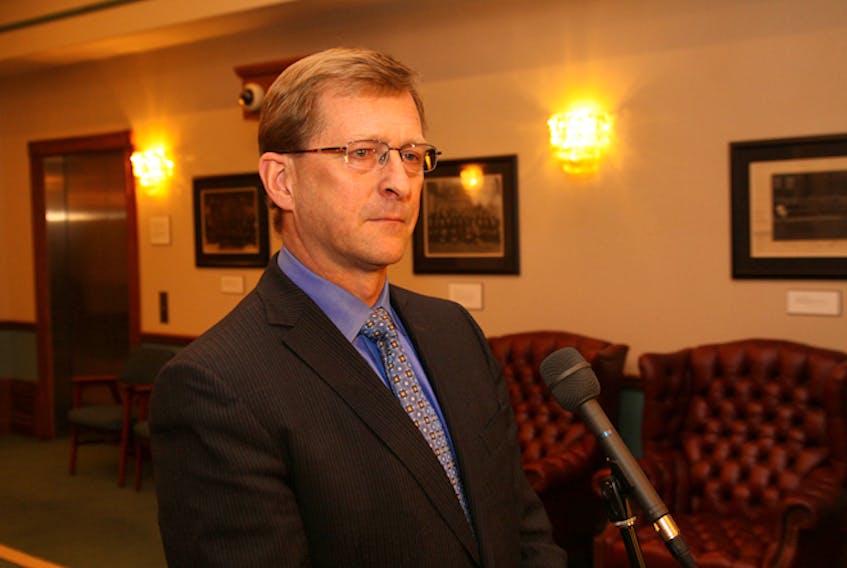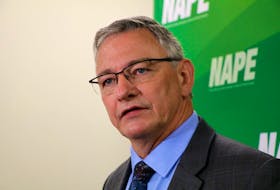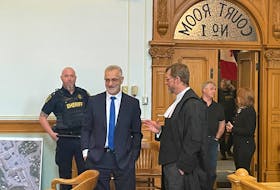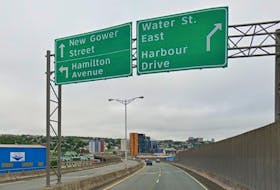The ongoing Muskrat Falls Inquiry has been well organized, proceeding methodically with witnesses. On Monday, it will be Jerome Kennedy.
He was the province’s natural resources minister at the time of the hydroelectric project’s sanctioning at the end of 2012. Kennedy was an aggressive supporter of the Muskrat Falls project. He sold it in newspaper interviews, on TV shows, on radio, in a stream of Twitter posts and, of course, in the House of Assembly.
As for what exactly he actually understood about the risks at the time — he’ll get a chance to answer to that. It will be interesting to see if his confidence remains.
At the inquiry, internal documents are available to lawyers to challenge or support statements. Witnesses are generally taken without interruption from one issue to the next, compelled to give the truth, the whole truth and nothing but, as they understand it.
In preparation for considering Kennedy’s testimony, The Telegram decided to offer up some direct transcript from a Q&A at a news conference at the Media Centre in Confederation Building on Dec. 18, 2012, as Kennedy prepared to debate Bill 60 and Bill 61, legislation to permit expropriation of land, new borrowing and lock-in ratepayers to Muskrat Falls.
•••
David Cochrane (CBC): The monopoly provision that ensures that Nalcor, or Hydro through Nalcor, maintains its monopoly on wholesale— I get how that ensures that there’s no new competition, no new entrants, so it doesn’t dilute your ability to sell the power and cover off the project costs. But a big selling point on building the Maritime Link was ending the isolation of this energy market, the geographic isolation. Now you’re putting in a regulatory isolation. It doesn’t allow anyone else to come in here or sell power in through that link to potentially provide a lower cost for ratepayers. I mean this sort of ensures there will never be a lower cost option to Muskrat Falls over the life of the financing.
Minister Jerome Kennedy: The way I would describe that David is as follows. We’re going to the markets based on the fact that there will be a revenue stream. That revenue stream is required by the lenders, by the rating agencies and by the federal loan guarantee. In order to ensure that revenue stream, there have to be ratepayers that will pay, as mandated by Newfoundland and Labrador Hydro the lowest rates possible. If we allow power to come into the province and that’s really what we’re looking at here, then what would happen is that there could be approval for more power than is needed, but you’ll still be paying for Muskrat Falls and could potentially be paying for the cost of other developments. So it’s both import and export when you look at it.
Cochrane: But a big part of being connected to the North American energy grid is — looking at it strictly as a ratepayer who wants the lowest power, competition, more options, access to other sources of energy — you can lower the rates. I mean you’re essentially assuring that can never happen, that we’re going to have to use Muskrat Falls and the existing generation and that’s it.
Kennedy: I think what we’re assuring is that the lowest rates are going to come into force with Muskrat Falls. There’s all of the analysis that has been done. If you look at everything from the cumulative present worth (CPW) analysis that Muskrat Falls is by far the lowest-cost option. So the lowest-cost option will result in the lowest rates. And we’ve published those rates as outlined in the rates paper. Without Muskrat Falls, again, the isolated option, the increase in rates will be twice as much as it will be without Muskrat Falls.
Sue Bailey (Canadian Press): But what if circumstances change? How are you— there’s no flexibility. You’re locked in here, you know? How will you respond to people who raise that concern?
Kennedy: Well if circumstances change, so can- the legislation can’t change in terms of the 50-year requirement for the revenue stream. That’s certainly, that’s the way the federal government has requested that the— and the banks, to be fair, and the lenders are also requesting that. But if things change, and there’s significant revenue, I mean governments in the future can look at ways to deal with that. Based on everything we know to date, this is the best option at present. And we think we’ve pretty exhaustively looked at the options. We’re just trying to cover everything off here.
(…)
James McLeod (The Telegram): The Public Utilities Board at its core is a consumer protection thing. It’s basically a check on Nalcor spending unlimited money and passing that along to the ratepayers. What consumer protection is there now for Nalcor spending as much money as it wants to on the Muskrat Falls project and just passing that straight along to consumers?
Kennedy: Well, OK. And there’s a couple of ways we have to deal with that James. First, under the federal loan guarantee, there will be the appointment of an Independent Engineer. In fact, an Independent Engineer has been appointed. The three initials out of Toronto… MWH, or MW… I can find out the name for you, but they have been appointed. The Independent Engineer has been appointed by the federal government in conjunction with the provinces and will be overseeing construction costs. The key issue right now and one that— even though we sanctioned yesterday, we’re passed that, now we get into the building of the project. Time means money here and so we have to ensure as best we can that the project proceeds on time, on schedule, on costs. The labour issue is really one that causes concern in terms of the potential for overruns there, so we’re going to be watching that closely, the province is going to be closely involved, and what we’re going to try and do— and look, we’ve published these rates. This was the Department of Natural Resources, in conjunction with Nalcor, based on their years in projecting what rates are going to be. So we’re fairly confident the rates we’ve outlined will be the rates in place in 2017.
McLeod: Well fairly confident is one thing. And having the best intentions to keep prices as low as possible, I don’t think anyone is disputing that. But is that any replacement for an independent, regulatory check?
Kennedy: It’s no different— last week we directed the PUB to deal with generation rates in Labrador. Today, with this piece of legislation, we’re directing them to ensure that Muskrat Falls costs are not changed. They will still be looking at the costs of other power on the island, they will continue to be playing the regulatory role. But if you’re asking me today am I totally satisfied with the way the PUB is set up, my answer to that is no. The Liberals have called for changes and that’s something that certainly will have to be looked at.
Ashley Fitzpatrick (The Telegram): But you’re talking about— what about, construction aside, when we get into operating? Because this covers your maintenance, your year-to-year capital costs as well. What, if any, regulatory provision is there to watch what happens on that front? Because you’re talking about 40 years of we’re going to kind of put in whatever money we want and no one’s going to tell us otherwise.
Kennedy: The revenue projections that we have and which have been presented to the — when I say we, Nalcor and the government — we’ve presented to bond rating agencies and to the lenders indicate a very robust return on equity starting as early as 2020. So we know that the revenue stream based on only the 40 per cent of the power — we’re not including any sales from Nova Scotia or in the industrial rates — so there will be a significant revenue stream and the government of the day will certainly be able to look at that and how they can deal with that.
Fitzpatrick: No. But let me walk you back. Because it’s the PUB piece, that right now they’re looking at year-to-year capital costs. You know, I want to put in 14 new washrooms on ‘X’ number of facilities— it’s in the tens of millions of dollars, the differences that they’re looking at for some of Hydro’s costs. So, where is that regulatory piece when it comes time to start operating Muskrat Falls? Who will be looking at the costs associated with Muskrat Falls? Because as I understand it, the Independent Engineer, his job ends with construction.
Kennedy: We will be looking at post-construction. There’s also discussions as to who and how we can maintain oversight of the costs after construction.
Fitzpatrick: But we don’t have that yet.
Kennedy: No. That’s something we’re still working on.
Cochrane: Minister, this legislation is kind of a Nalcor protection act, right? It kind of ensures they’re going to have the revenue stream to pay for their debts, to pay for their projects, but in terms of the ratepayers, the end users, we have to rely on good intentions, competent engineering and no unforeseen circumstances on the project to make sure that our rates are going to be as good as you say they are. The PUB has been removed from the process. It still sets the blended rate, but when you control what goes in, you really— it’s an input, output thing. When you control what goes in, you control what comes out at the other end. There’s really not a lot of protection here for ratepayers if things go poorly at Muskrat Falls.
Kennedy: One of the things David that we had to do — your point is fair — but one of the things we’ve had to do here, to secure a billion dollars for the people of our province, this is the kind of financing structure that we need to put in place. So in terms of maintaining the lowest rates, we’re confident that Muskrat Falls will provide the lowest rates. The PUB will be directed to take certain steps as they were last week with the generation component of the Labrador Industrial Rates and we at this stage, especially with the PUB structure as it currently exists in this province, I certainly have no difficulty with the way we’re doing this.
Cochrane: Sorry, whatever are your thoughts on the PUB, but there’s nothing we can really point at in Bill 60 and Bill 61 and say, hey ratepayer, that clause right there, that’s what looks after you. Because it’s not there.
Kennedy: Well Newfoundland and Labrador Hydro is mandated to provide the lowest-cost rates. We’ve structured Muskrat Falls in a way to provide the lowest-cost rates. We’ve always got to come back to, well if we need power, well we have to do something. Muskrat Falls is the lowest-cost option and in order to obtain that billion-dollar benefit to the people of our province that will reduce the rates— and that’s where it’s going, it goes directly into the rates- then this is the structure that we have to adopt.
Cochrane: But it seems to me this law, this legislation, the way it’s spelled out, it protects Nalcor from project failure. If something goes wrong—
Kennedy: David, I’m entirely, I’m very confident there’s not going to be any project failure here. There’s been significant engineering done. We know, and there’s been extensive work done on the Lower Churchill over 40 years, we know the power that’s needed on the island portion of the province. If only some of the mining projects proceed, we know that other power will be utilized (in Labrador). And we also know that right now we can sell power in the spot markets in the United States, but reports that I’ve seen in the recent past indicate by the early 2020s that the markets will open up again.
(Reporters move to interject)
Kennedy: Look, the PUB will be directed. We’re not apologizing for that. It’s the financing structure. Forget whether this PUB, which we will look at after Christmas. This is what we have to do.
Cochrane: What do you mean by that? You’re going to look at them after Christmas?
Kennedy: Right now we’re going to go through with these bills and we’re going to proceed with the Muskrat Falls structure, the financing structure. The Liberals have been calling for changes to the PUB. What I’m saying to you is after Christmas, when this is all done, we will be seriously looking at the structure of the PUB as it’s set up in this province. I’m not talking about individuals, the structure of the PUB as it’s set up in this province, to determine if there’s a way to strengthen it and to ensure that we have the people there to carry out the work that needs to be done.
McLeod: But based entirely on this legislation, it looks like you’re sacrificing consumer protections for the best price on interest rates and the federal loan guarantee, is that a fair assessment?
Kennedy: No, I don’t think it is at all, James. I think that if you want the PUB involved and it costs us a billion dollars, well you talk to the people out there who’ve got to pay their light bills. What this billion dollars does is it reduces electricity rates. The electricity rate that we’ve published in that paper, say 232 in 2017, that includes everything. That’s the cost of the project. The financing on the multi-billion-dollar project is huge. So, if you want the PUB involved, you sacrifice a billion dollars. And we’re not doing that.
McLeod: But that number is just a projected rate based on whatever costs you think there are now. That rate can change entirely depending on how much you actually spend to build a dam, right?
Kennedy: But we’re confident based on what Mr. Martin has told us that a lot of the major engineering work has been done, especially around the dam. The unknown factor at this point— you have to remember we have a transmission line that’s being built right through the province. There’s going to be a lot of work in rural Newfoundland and Labrador, there’s going to be a lot of hotels that are filled, a lot of businesses that are going to have a lot of money that I don’t think anyone has really considered at this point. It’s the labour costs that are difficult to pin down. It’s not the capital costs at this point as much of building the dam, or building a transmission line, it’s the labour costs that could result in or could contribute to an overrun. But again, we’re creating 3,500 jobs with this project. I mean we’re in a time where throughout the world there’s a significant downturn in the economy. Governments are calling for a stimulus, for stimulus packages, well we have a built-in stimulus package here that looks after our future, provides us with energy that we need and results in lowest-cost rates to the people of our province.
Cochrane: We’re talking about a 50-year project here though, so short-term economic considerations. I mean this is about 50 years of electricity rates and financing on a project driven by a monopoly company that has been exempted from regulatory oversight check. I mean the whole point of having regulation is a check against monopolies. And we’re in a situation now where not only was it removed from the process, now it’s being further restricted and directed by the very people who are the core proponents of this project.
Kennedy: The—
Cochrane: —I mean look, I accept stimulus and jobs, and all that sort of stuff, but I’m going to pay a power bill on this. We’re all going to pay power bills on this. And I guess other than your confidence and your projections, what is the comfort for people who may not necessarily share your confidence?
Kennedy: It’s not my confidence and my projections. This is based on the experts that we have hired—
Cochrane: —government, Nalcor, everyone—
Kennedy: —well, we’ve had this reviewed by numerous individuals. What we’re trying to do here is ensure the best deal we can for the people of the province. The sanction decision has been made. We’re moving ahead. And we need to do this in order to put the financing in place.
(…)
Bailey: Sir how concerned are you about the fact that, can you point to a megaproject that hasn’t gone at least 50 per cent over budget? Some of them go 100 per cent over. How concerned are you about that?
Kennedy: No. Where have they gone over budget like that?
Bailey: There’s many examples—
Kennedy: —OK. What are they?
Bailey: (Inaudible) is the latest.
Kennedy: That was decision gate two numbers.
Bailey: No it’s not. Those are the latest numbers.
Kennedy: OK.
Bailey: But sir, just in general, how concerned are you that megaprojects have a very bad habit of going way over budget?
Kennedy: Look, I’m concerned that these big projects— I’ve watched Vale Inco, I’m watching Hebron. OK? But we have to at some point trust the experts. When we have Nalcor, we have Newfoundland and Labrador Hydro. We have Manitoba Hydro reviewing the project. The engineering is now at the stage where it’s at where we have, as Mr. Martin has indicated, 50 per cent of the engineering done on some significant parts. So, we can either accept that there’s risk, because we have to. There’s always risk in the future. We try to minimize it. Or we can do nothing. Now we’ve decided yesterday that we are proceeding with the project. That’s what sanction means.
Cochrane: I just think we need to be clear on who’s bearing the risk, and it is the ratepayers. I mean, there’s no risk to Nalcor. They’re guaranteed enough money to cover their rate of return. When we talk about other things and bearing risk, the Manitoba Hydro examples that are being used, that’s the company bearing it for export. They’re going to lose cash or whatever. But it’s the ratepayers who bear this risk. That is correct, right? It’s all on us.
Kennedy: There’s no question. Any risk of the overruns here, the risks are being born by the ratepayer, which are being born... that’s a fair comment. But we’re confident enough— I can’t say to you that there won’t be overruns. But what I can say to you is we have confidence that the work has been done at this stage, at decision gate three, to ensure that the overruns are kept to a minimum.
•••
The press conference lasted between half an hour and 45 minutes. This is not a complete transcript.
Before it was over, Kennedy told reporters the government would be willing to sit through Christmas Day and Boxing Day, and as long as was required, to get the two bills through the House.
In the pre-dawn hours of Saturday, Dec. 22, Bill 60 and Bill 61 passed, and ultimately became law.
The Muskrat Falls hydroelectric project has since run wildly over budget, moving from an estimated $6.2 billion (without financing costs) to $12.7 billion (including financing), and is years behind schedule with construction ongoing.
Phase two of the public inquiry, digging into the specifics behind the cost increases, will be undertaken in 2019.









